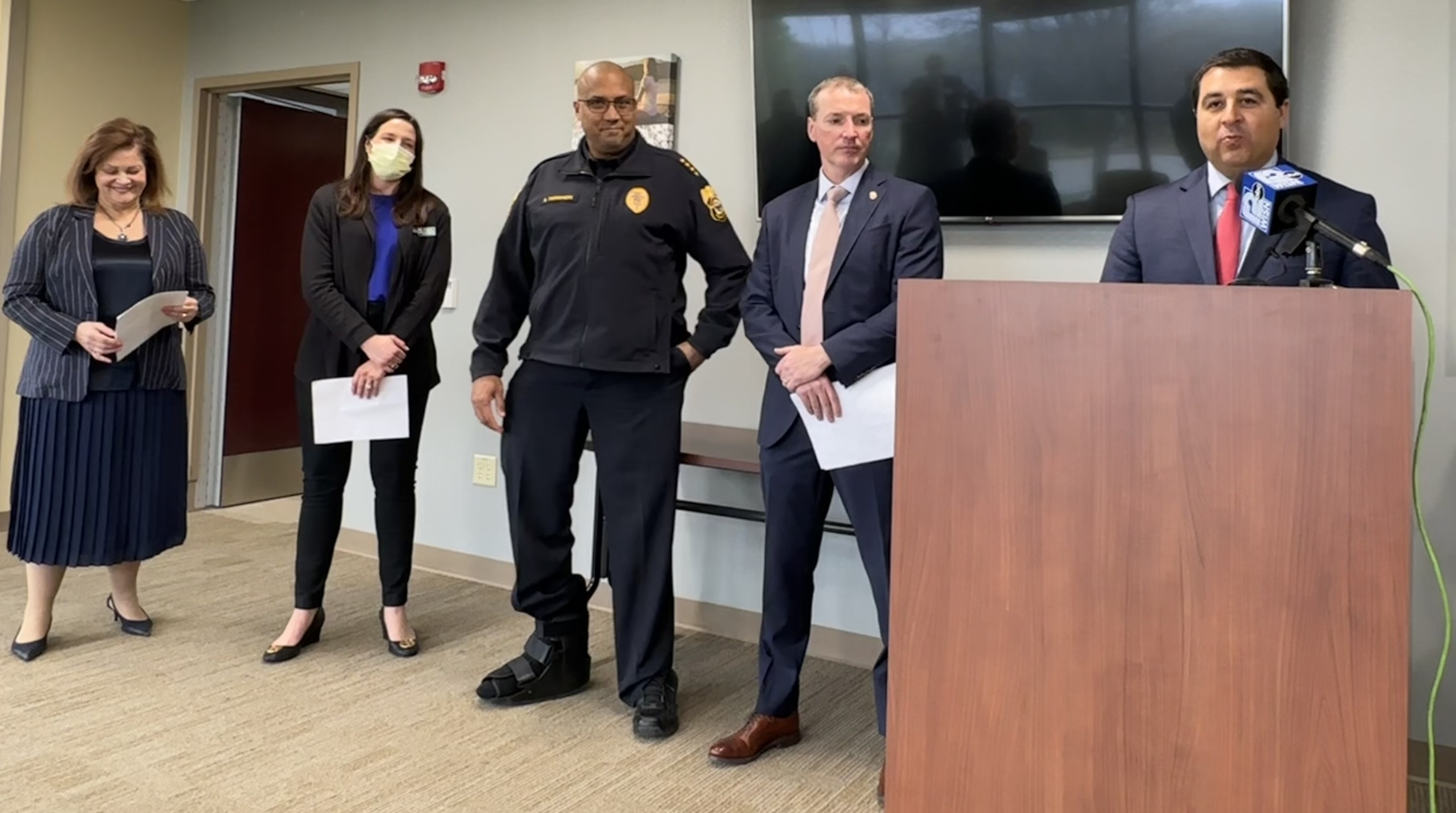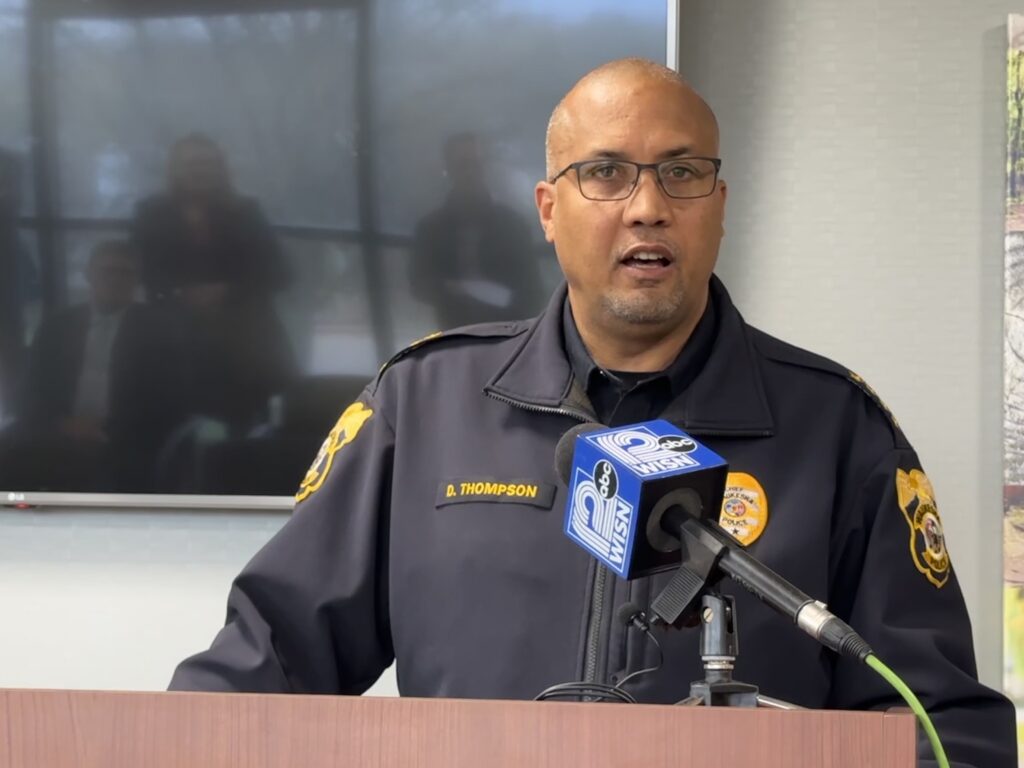DEA: ‘One pill can kill:’ National drug takeback day on Saturday an opportunity to protect Wisconsinites, nation
By: Steve Schuster, [email protected]//April 20, 2023//
DEA: ‘One pill can kill:’ National drug takeback day on Saturday an opportunity to protect Wisconsinites, nation
By: Steve Schuster, [email protected]//April 20, 2023//

By Steve Schuster
[email protected]
Wisconsinites will join the rest of the nation Saturday in an effort to anonymously dispose of dangerous pharmaceuticals.
“I would just like to remind everybody that one pill can kill and drug takeback is an opportunity for citizens across the United States and Wisconsin to both free and anonymously dispose of unwanted medications in kitchen drawers, in bathroom drawers, in medicine cabinets. There are no (legal) consequences for the drop off,” said U.S. Drug Enforcement Administration (DEA) Special Agent John McGarry, who is the special agent in-charge of the DEA Wisconsin’s largest office.
According to McGarry, the drug takeback program has been in place since 2010.
“This is our 24th (drug takeback). In these 24 iterations we have seized with our partner from state and local agencies, 8400 tons of illicit pharmaceuticals across the U.S. and U.S. Territories. That’s pharmaceuticals that would otherwise go into landfills or water supplies, have a big environmental impact or would otherwise sit in bathrooms and kitchens in drawers and car consoles across the country giving access to folks that shouldn’t have them,” said McGarry at Thursday’s press conference.
Wisconsin is no stranger to the opioid epidemic. McGarry said last year’s drug takeback yielded 113,000 pounds of pharmaceuticals just in Wisconsin alone.
“We have seen a truly alarming rise in the volume of Fentanyl that’s present in illegal opioids and by stopping people from becoming addicted on the front end we can help keep Wisconsinites safe,” said Wisconsin Attorney General Josh Kaul at the press conference Thursday.
In anticipation of National Prescription Drug Take Back Day on April 22, Kaul and McGarry spoke at Froedtert Hospital in Menomonee Falls on Thursday. Joined by Kaul and McGarry, Deputy Secretary Deb Standridge of the Wisconsin Department of Health and Human Services, Waukesha Police Chief Daniel Thompson, and Kate Schaafsma, director of Pharmacy, Froedtert & the Medical College of Wisconsin Community, spoke in a room of journalists, health care professionals and law enforcement.
When asked by the Wisconsin Law Journal if the legalization of marijuana in border states such as Illinois have impacted the opioid crisis in Wisconsin, Kaul said he has had similar discussions with Wisconsin law enforcement officials in border counties.
Kaul said although there has not been a significant impact with law enforcement resources, his office and local law enforcement continue to monitor the situation.
Kaul noted that historically Wisconsin has “consistently been a national leader in this program.”
“The volume of unwanted and unused medications that we collect every six months is always at or very near the top of the nation even when compared to much bigger states such as Texas and California,” Kaul said, asking the public to not flush their medications and to dispose of them properly at a designated drop box location.
Kaul also noted that “this year’s drug takeback falls on Earth Day, which is fitting because this program helps protect our water supply as well as protecting people’s safety.”
There are more than 158 drug takeback events planned throughout the state of Wisconsin on Saturday with more than 280 participating law enforcement agencies, Kaul said at Thursday’s press conference. Kaul noted that there are also more than 490 drop boxes located throughout the state that are open year-round.
“By all of us working together we can be the safety net for people who are taking the steps towards recovery from opiate and other substance use disorders,” said Deb Standridge, deputy secretary of Wisconsin’s Department of Health and Human Services.
“We can recognize that these disorders are not caused by lack of character. They are a real medical condition that require hope, empathy and understanding,” Standridge added.
Speaking on behalf of the Wisconsin Police Chief’s Association, Thompson said, “we are passionate about keeping our communities safe,” noting that the drug takeback program helps keep children and adults safe by keeping dangerous pills out of reach.

Milwaukee County also announced Thursday that an agreement has been reached to enter into a second, historic $56 million opioid litigation settlement, as a result of one of three pending federal cases brought by the county against opioid defendants. This settlement, combined with the first $72 million settlement agreed to in late 2021, equals a total recovery of $128 million for Milwaukee County. After attorney fees, the net recovery to the county totals $101 million to date, according to Milwaukee County Officials.
Drug Take Back Day provides a safe, convenient and responsible means of disposal, while also educating the community about the potential abuse and consequences of improper storage and disposal of these medications.
To find a Drug Take Back location near you, go to www.dhs.wisconsin.gov/opioids/drug-take-back-day.htm.
To ensure the success of Drug Take Back Day, the DOJ relies on assistance from the DEA, and the support of Fuchs Trucking, Covanta Energy, the Wisconsin State Patrol, Wisconsin Department of Health Services, Wisconsin Department of Military Affairs, the Indiana State Police, Waukesha County, Waukesha County Sheriff’s Office, and all participating local law enforcement agencies.
GUIDELINES:
All waste pharmaceuticals must be generated by a household – no businesses are allowed.
Bring: Prescription (controlled and non-controlled) and over-the-counter medications, ointments, patches, inhalers, non-aerosol sprays, creams, vials and pet medications. Vape pens or other e-cigarette devices (batteries removed).
Do Not Bring: Illegal drugs, needles/sharps, acids, aerosol cans, bio-hazardous materials (anything containing a bodily fluid or blood), personal care products (shampoo, soaps, lotions, sunscreens), household hazardous waste (paint, pesticides, oil, gas), mercury thermometers.
Participants may dispose of solid, non-liquid medication(s) by removing the label or blacking out personal information on the label of the plastic pill container or by putting the medication into a clear sealable plastic bag. Blister packages without the medications being removed are also acceptable.
Liquids will be accepted during this initiative. However, the liquids, creams and sprays must be in their original packaging. Liquids without the original packaging will not be accepted.
Illicit substances such as marijuana or methamphetamine are not a part of this initiative and should not be placed in collection containers.
Ethan Duran also contributed to this report.
Legal News
- Wisconsin attorney loses law license, ordered to pay $16K fine
- Former Wisconsin police officer charged with 5 bestiality felony counts
- Judge reject’s Trump’s bid for a new trial in $83.3 million E. Jean Carroll defamation case
- Dozens of deaths reveal risks of injecting sedatives into people restrained by police
- The Latest: Supreme Court arguments conclude in Trump immunity case
- Net neutrality restored as FCC votes to regulate internet providers
- Wisconsin Attorney General asks Congress to expand reproductive health services
- Attorney General Kaul releases update at three-year anniversary of clergy and faith leader abuse initiative
- State Bar leaders remain deeply divided over special purpose trust
- Former Wisconsin college chancellor fired over porn career is fighting to keep his faculty post
- Pecker says he pledged to be Trump campaign’s ‘eyes and ears’ during 2016 race
- A conservative quest to limit diversity programs gains momentum in states
WLJ People
- Power 30 Personal Injury Attorneys – Russell Nicolet
- Power 30 Personal Injury Attorneys – Benjamin Nicolet
- Power 30 Personal Injury Attorneys – Dustin T. Woehl
- Power 30 Personal Injury Attorneys – Katherine Metzger
- Power 30 Personal Injury Attorneys – Joseph Ryan
- Power 30 Personal Injury Attorneys – James M. Ryan
- Power 30 Personal Injury Attorneys – Dana Wachs
- Power 30 Personal Injury Attorneys – Mark L. Thomsen
- Power 30 Personal Injury Attorneys – Matthew Lein
- Power 30 Personal Injury Attorneys – Jeffrey A. Pitman
- Power 30 Personal Injury Attorneys – William Pemberton
- Power 30 Personal Injury Attorneys – Howard S. Sicula











